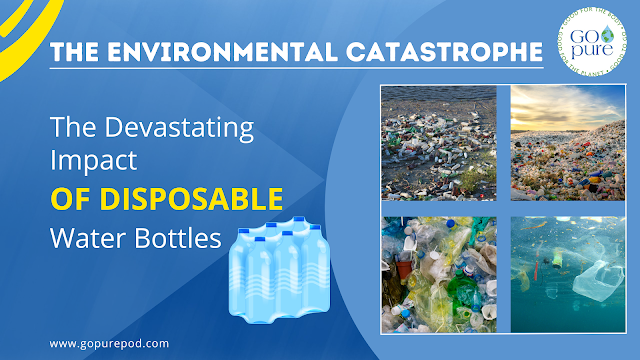The Environmental Catastrophe: The Devastating Impact of Disposable Water Bottles
We live in a world where convenience often takes precedence over sustainability. One glaring example of this is the widespread use of disposable water bottles. While they may seem convenient, their impact on the environment is devastating. In this blog post, we will explore the harmful effects of disposable water bottles and discuss sustainable solutions to this problem.
Tap or Bottled Water: Which is Better?
One of the most prominent debates when it comes to drinking water
is whether tap water or bottled water is the better option. While bottled water
may appear to be pure and safe, the reality is quite different. In many cases,
tap water is actually held to stricter safety standards than bottled water. The
EPA, or Environmental Protection Agency, regulates tap water quality, ensuring
that it meets specific standards for contaminants. On the other hand, bottled
water is regulated by FDA, but its standards are not as rigorous. Therefore,
choosing tap water with a portable water filter over bottled water is more
cost-effective and better for the environment.
Plastic and Your Health
Beyond the environmental impact, disposable water bottles can also
pose health risks. Plastic bottles are typically made from PET or polyethylene
terephthalate, which can leach harmful chemicals into the water, especially in
case of exposure to heat or sunlight. These chemicals, such as phthalates and
bisphenol A (BPA), have been linked to various health issues, including
hormonal imbalances and reproductive problems. By using reusable water bottles
made from safe materials like glass or stainless steel, you can protect both
the environment and your health.
Environmental Impact
Disposable water bottles have a significant environmental impact due to various factors, including their production, consumption, and disposal. Here are some critical points regarding their environmental impact:
- Resource Depletion: The production of disposable water bottles requires the extraction of natural resources, such as oil and natural gas, to produce the plastic materials used. These resources are finite and non-renewable, leading to their depletion over time.
- Greenhouse Gas Emissions: The manufacturing process of plastic bottles involves energy-intensive activities that contribute to greenhouse gas emissions. Greenhouse gases, such as carbon dioxide (CO2), contribute to climate change and global warming.
- Water Usage: The production of disposable water bottles also requires substantial amounts of water. Water is utilized at various stages, from extracting raw materials to the actual bottling process. This can strain local water supplies, particularly in regions already facing water scarcity issues.
- Plastic Pollution: One of the most crucial environmental concerns related to disposable water bottles is plastic pollution. Many plastic bottles end up in landfills, incinerators, or worse, as litter in natural environments. Plastic waste requires hundreds of years to decompose, and as they break down, they release microplastics, which pose a threat to wildlife and ecosystems.
- Waste Generation: In addition to plastic bottles, the production process generates waste, including excess plastic material, packaging, and transportation-related waste. This waste contributes to the overall burden on waste management systems and landfills.
- Recycling Challenges: While recycling is an option for plastic bottles, it faces several challenges. Many bottles are not recycled and end up in the general waste stream. The recycling process itself requires energy & resources, and not all varieties of plastic bottles can be effectively recycled. As a result, a significant percentage of plastic bottles still end up as waste.
We can significantly mitigate these environmental crises by
reducing our reliance on disposable water bottles. Instead, go for a portable
tap water filter to suffice our drinking water needs.
Sustainable Solutions
Sustainable alternatives should be embraced to combat the harmful
effects of disposable water bottles. One such solution is the use of reusable
water bottles. Reusable water bottles are made from more sustainable materials
than plastic, such as stainless steel or glass. These are far better for your
health and the environment. Another innovative option is to use a portable
water filter like GOpure. These small water filter pods can be
dropped into any water bottle, purifying the water by removing impurities and
odors.
Investing in reusable water bottles and utilizing portable
water purification technologies can significantly reduce our consumption of
disposable water bottles. These sustainable solutions protect the planet and
save money in the long run. Additionally, advocating for policies that promote
tap water quality and accessibility can further support the shift toward more
sustainable practices.
Conclusion
The widespread use of disposable water bottles is wreaking havoc
on our planet. The environmental impact is immense, and we cannot ignore the
health risks associated with plastic bottle usage. However, we can minimize our
contribution to this global crisis by making conscious choices and adopting
sustainable alternatives like reusable water bottles and water purifier pods
such as the GOpure Pod. Let's prioritize the health of the planet and
future generations by saying no to disposable water bottles and embracing
eco-friendly options.



Comments
Post a Comment